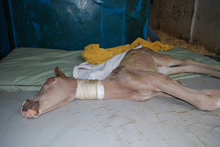The Onderstepoort Veterinary Genetics Laboratory has recently found the mutation responsible for the genetic condition known as Lavender Foal Syndrome (LFS) in Arabian horses and has developed a DNA based test for this condition.

Symptoms of lavender foal syndrome
The discovery of the Lavender Foal Syndrome mutation and development of the genetic test is a significant scientific finding and will make a valuable contribution to the knowledge of the genetics of the horse.
© 2013 by Dr. Yael Giora
The mode of inheritance of LFS and SCID (Severe Combined Immunodeficiency Disease) is similar, both are autosomal recessive and test results indicate whether an animal has 2 defective alleles (affected), one defective allele (carrier) or 2 normal alleles (clear).
The affected animal has a pale blue / lavender coat colour and severe neurological deficits that are incompatible with life and will result in death within hours to a maximum of a few days. The clear and carrier animals are completely normal.
Similar to SCID, an affected animal can only be produced when 2 carriers are bred to each other, but no affected animals will be produced when a clear and carrier are bred to each other. A test and selective breeding strategy is, therefore, again recommended for LFS, similar to that done with SCID that resulted in a decrease of SCID carrier prevalence in the South African Arabian horse population from 8.3% to 5.2% since 2004.
The discovery of the LFS mutation and development of the genetic test is a significant scientific finding and will make a valuable contribution to the knowledge of the genetics of the horse.
The discovery has also highlighted the value of the close cooperation between our laboratory at the Faculty of Veterinary Science and the Arabian horse breeding community. Without the support and samples supplied by breeders locally this achievement would not be possible.
Not only is our Arabian breeding community unique in its support of scientific study, particularly in terms of genetics but also in the application of genetic disease test results. The open test and selective breeding strategy used to reduce the prevalence of SCID is also an indication of the local Arabian breeder’s commitment to removing unwanted traits from our stock while maintaining the favourable genetics.
